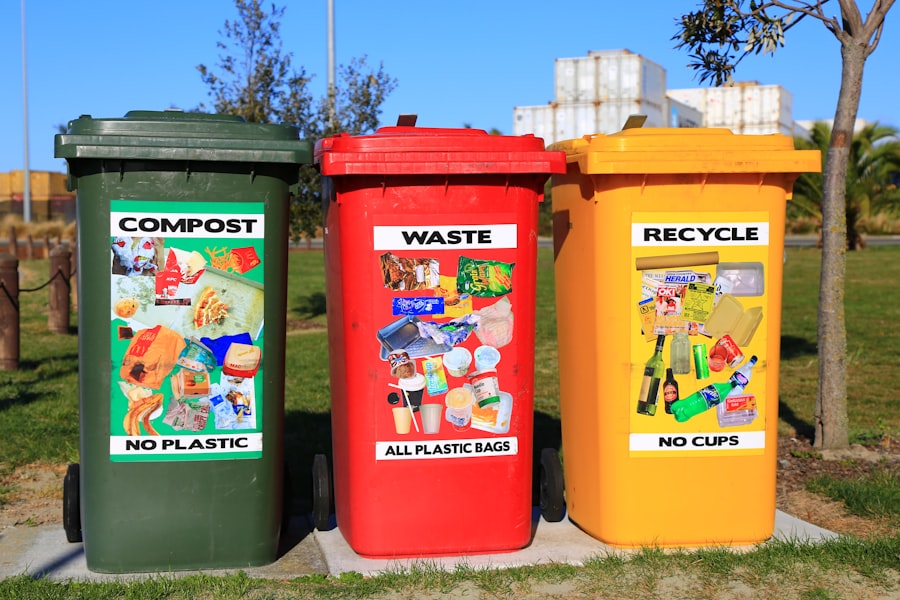Waste treatment operations are an essential part of managing and disposing of waste in a safe and environmentally friendly manner. These operations involve the collection, transportation, processing, and disposal of various types of waste, including solid waste, wastewater, and hazardous waste. Waste treatment facilities play a crucial role in protecting public health and the environment by ensuring that waste is handled and disposed of properly.
Waste treatment operations can be complex and challenging, requiring careful planning, coordination, and management to ensure that waste is treated effectively and efficiently. These operations often involve multiple stakeholders, including waste management companies, government agencies, and environmental organizations. Effective waste treatment operations require the use of advanced technologies and systems to track and manage waste streams, monitor environmental impacts, and ensure compliance with regulations.
Key Takeaways
- Waste treatment operations are essential for managing and processing waste materials in an environmentally friendly manner.
- Challenges in waste treatment operations include regulatory compliance, operational efficiency, and cost management.
- Customer Relationship Management (CRM) systems play a crucial role in streamlining and optimizing waste treatment operations.
- Billing automation in waste treatment operations can lead to improved accuracy, efficiency, and cost savings.
- SMS-iT CRM’s billing automation optimizes waste treatment operations by integrating customer data, automating billing processes, and providing real-time insights for better decision-making.
Challenges in Waste Treatment Operations
Waste treatment operations face a range of challenges that can impact their effectiveness and efficiency. One of the primary challenges is the increasing volume and complexity of waste streams, which can strain existing infrastructure and resources. As populations grow and urbanization increases, the amount of waste generated continues to rise, placing greater demands on waste treatment facilities and systems.
Another challenge is the need to comply with stringent environmental regulations and standards. Waste treatment operations must adhere to a variety of regulations related to air and water quality, waste disposal, and hazardous materials handling. Ensuring compliance with these regulations requires careful monitoring, reporting, and documentation, which can be time-consuming and resource-intensive.
Additionally, waste treatment operations must contend with the need to optimize resource utilization and minimize costs. This includes managing transportation logistics, maximizing the use of treatment facilities, and minimizing energy consumption. Balancing these competing priorities while maintaining high levels of service and environmental stewardship can be a significant challenge for waste treatment operators.
The Role of CRM in Waste Treatment Operations
Customer Relationship Management (CRM) systems play a critical role in waste treatment operations by helping organizations manage their interactions with customers, stakeholders, and regulatory agencies. CRM systems provide a centralized platform for tracking customer information, managing communication channels, and analyzing customer data. In the context of waste treatment operations, CRM systems can help organizations streamline their processes, improve customer service, and enhance regulatory compliance.
CRM systems enable waste treatment operators to track customer interactions, manage service requests, and provide timely responses to inquiries. By centralizing customer data and communication channels, CRM systems help organizations deliver more personalized and responsive service to their customers. This can lead to higher levels of customer satisfaction and loyalty, as well as improved operational efficiency.
In addition to customer management, CRM systems can also help waste treatment operators track and manage regulatory compliance requirements. By centralizing regulatory information, documentation, and reporting processes, CRM systems enable organizations to ensure that they are meeting their obligations under environmental regulations. This can help organizations avoid costly fines and penalties while demonstrating their commitment to environmental stewardship.
Benefits of Billing Automation in Waste Treatment Operations
| Benefits of Billing Automation in Waste Treatment Operations |
|---|
| 1. Improved accuracy in billing |
| 2. Reduction in billing errors |
| 3. Streamlined billing process |
| 4. Increased efficiency in revenue collection |
| 5. Enhanced customer satisfaction |
| 6. Better financial management |
Billing automation offers several benefits for waste treatment operations, including improved accuracy, efficiency, and customer satisfaction. By automating the billing process, waste treatment operators can reduce the risk of errors and delays in invoicing, leading to faster payment processing and improved cash flow. Additionally, billing automation can help organizations streamline their billing processes, reduce administrative costs, and free up staff time for more strategic activities.
Automating the billing process also enables waste treatment operators to provide more flexible billing options for their customers. This can include online payment portals, electronic invoicing, and automated payment reminders. By offering these options, organizations can improve customer convenience and satisfaction while reducing the burden on their internal billing processes.
Furthermore, billing automation can provide valuable insights into customer billing patterns and trends. By analyzing billing data, organizations can identify opportunities to optimize pricing structures, improve revenue forecasting, and enhance customer retention strategies. This can help waste treatment operators better understand their customers’ needs and preferences while maximizing their revenue potential.
How SMS-iT CRM’s Billing Automation Optimizes Waste Treatment Operations
SMS-iT CRM’s billing automation offers a comprehensive solution for waste treatment operators looking to streamline their billing processes and improve customer management. The system integrates seamlessly with existing operational systems to capture billing data in real-time, enabling organizations to generate accurate invoices quickly and efficiently. This reduces the risk of errors and delays in billing while improving cash flow and financial visibility.
SMS-iT CRM’s billing automation also provides a range of flexible billing options for customers, including online payment portals, electronic invoicing, and automated payment reminders. This enhances customer convenience and satisfaction while reducing the administrative burden on waste treatment operators. Additionally, the system offers robust reporting and analytics capabilities, enabling organizations to gain valuable insights into customer billing patterns and trends.
Furthermore, SMS-iT CRM’s billing automation is designed to integrate seamlessly with regulatory compliance requirements, ensuring that organizations can meet their obligations under environmental regulations. The system provides centralized documentation and reporting processes for regulatory compliance, enabling organizations to demonstrate their commitment to environmental stewardship while avoiding costly fines and penalties.
Case Studies: Successful Implementation of SMS-iT CRM in Waste Treatment Operations

Several waste treatment operators have successfully implemented SMS-iT CRM’s billing automation to optimize their operations and improve customer management. One such organization, a municipal wastewater treatment facility, implemented SMS-iT CRM’s billing automation to streamline its invoicing processes and improve customer satisfaction. By automating its billing processes, the facility was able to reduce errors and delays in invoicing while providing more flexible billing options for its customers. This led to improved cash flow and higher levels of customer satisfaction.
Another case study involves a hazardous waste management company that implemented SMS-iT CRM’s billing automation to enhance its regulatory compliance processes. By centralizing its regulatory documentation and reporting processes within the CRM system, the company was able to ensure that it was meeting its obligations under environmental regulations while improving operational efficiency. This enabled the company to avoid costly fines and penalties while demonstrating its commitment to environmental stewardship.
The Future of Waste Treatment Operations with SMS-iT CRM’s Billing Automation
In conclusion, waste treatment operations face a range of challenges related to managing waste streams, complying with environmental regulations, and optimizing resource utilization. SMS-iT CRM’s billing automation offers a comprehensive solution for waste treatment operators looking to streamline their billing processes, improve customer management, and enhance regulatory compliance. By integrating seamlessly with existing operational systems, providing flexible billing options for customers, and offering robust reporting and analytics capabilities, SMS-iT CRM’s billing automation enables organizations to optimize their operations while demonstrating their commitment to environmental stewardship. As waste treatment operations continue to evolve in response to changing environmental regulations and market demands, SMS-iT CRM’s billing automation will play a crucial role in helping organizations meet these challenges while delivering high levels of service and environmental stewardship.
Check out our latest article on how to revolutionize your customer relationship management with SMS-iT software. In this insightful piece, we delve into the ways in which businesses can boost their operations and streamline waste treatment processes through the use of SMS-iT CRM’s billing automation. This innovative approach not only enhances efficiency but also improves customer satisfaction. To learn more about the benefits of SMS-iT CRM, watch our overview video on YouTube. Read more
FAQs
What is SMS-iT CRM’s Billing Automation?
SMS-iT CRM’s Billing Automation is a software solution designed to streamline waste treatment operations by automating the billing process. It helps waste treatment facilities to efficiently manage their billing operations, reduce errors, and improve overall productivity.
How does SMS-iT CRM’s Billing Automation work?
SMS-iT CRM’s Billing Automation works by integrating with the waste treatment facility’s existing systems to automate the billing process. It can generate invoices, track payments, and manage customer accounts, all while reducing the need for manual data entry and paperwork.
What are the benefits of using SMS-iT CRM’s Billing Automation?
Some of the benefits of using SMS-iT CRM’s Billing Automation include improved accuracy in billing, reduced administrative workload, faster payment processing, and better customer service. It also helps waste treatment facilities to stay compliant with regulations and improve overall operational efficiency.
Can SMS-iT CRM’s Billing Automation be customized to fit specific waste treatment operations?
Yes, SMS-iT CRM’s Billing Automation can be customized to fit the specific needs of different waste treatment operations. It can be tailored to accommodate different billing structures, customer requirements, and regulatory compliance needs.
Is SMS-iT CRM’s Billing Automation user-friendly?
Yes, SMS-iT CRM’s Billing Automation is designed to be user-friendly and intuitive. It is built with a user-friendly interface and can be easily integrated into existing systems, making it easy for waste treatment facility staff to adapt to and use effectively.







